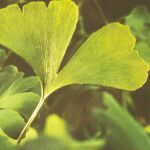| Medicinal Uses: |
Internally for asthma, allergic inflammatory responses, cerebral insufficiency in the elderly, senile dementia, circulatory complaints, such as Raynaud's disease, varicose veins, or irregular heartbeat (leaves); also for asthma, coughs with thick phlegm, and urinary incontinence (seeds). Combined with Tilia spp. (See, small-leaved linden), and Vinca major (See, greater periwinkle) or Crataegus laevigata (See, hawthorn) for circulatory disorders, and with Melilotus officinalis (See, yellow melilot) for venous complaints (leaves); with Ephedra spp. (See, joint fir), Tussilago farfara (See, coltsfoot), and leaves of Morus alba (See, white mulberry) for asthma and coughs (seeds). Excess may cause dermatitis, headaches, diarrhea, and vomiting.
To treat asthma, angina, tonsilitis, dizziness, headache; to combat inflammation; to improve concentration and memory deficits due to peripheral arterial disease. Germany's Commission E has approved the use of ginkgo biloba to treat the symptoms of organic brain dysfunction, cramp like calf pain (Intermittent claudication), vertigo caused by vascular problems, and ringing in the ears (tinnitus) due to vascular problems.
Ginkgo has antibacterial, antifungal, astringent, cardiotonic, memory-boosting, vasodilating, and stimulant properties. It also helps to prevent blood clots, lessen allergic reactions, inhibit production of damaging free radicals, and strengthen blood vessels in the heart and brain. Ginkgo is taken internally as a general tonic to treat allergies, asthma, atherosclerosis (hardening of the arteries in the heart), Alzheimer's disease, blood-clotting disorders, cerebral atherosclerosis (hardening of the arteries in the brain), coughs, depression, fatigue, headaches, heart attacks, phlebitis (inflammation of the veins), poor circulation, poor concentration and memory, Raynaud's disease, strokes, tinnitus (ringing in the ears), and vertigo (dizziness), and wheezing. |
| Drug Interactions: |
| Taking ginkgo biloba with these drugs may increase the risk of bleeding or bruising: |
| Abciximab, (ReoPro) |
Acemetacin, (Acemetacin Heumann, Acemetacin Sandoz) |
Alteplase, (Activase, Cathflo Activase) |
Antithrombin III, (Thrombate III) |
| Argatroban, (Argatroban) |
Aspirin, (Bufferin, Ecotrin) |
Aspirin and Dipyridamole, (Aggrenox) |
Bivalirudin, (Angiomax) |
| Celecoxib, (Celebrex) |
Choline Magnesium Trisalicylate, (Trilisate) |
Choline Salicylate, (Teejel) |
Clopidogrel, (Plavix) |
| Dalteparin, (Fragmin) |
Danaparoid, (Orgaran) |
Diclofenac, (Cataflam, Voltaren) |
Diflunisal, (Apo-Diflunisal, Dolobid) |
| Dipyridamole, (Novo-Dipiradol, Persantine) |
Dipyrone, (Analgina, Dinador) |
Drotrecogin Alfa, (Xigris) |
Enoxaparin, (Lovenox) |
| Eptifibatide, (Integrillin) |
Etodolac, (Lodine, Utradol) |
Etoricoxib, (Arcoxia) |
Fenoprofen, (Nalfon) |
| Flurbiprofen, (Ansaid, Ocufen) |
Fondaparinux, (Arixtra) |
Heparin, (Hepalean, Hep-Lock) |
Hydrocodone and Aspirin, (Damason-P) |
| Hydrocodone and Ibuprofen, (Vicoprofen) |
Ibritumomab, (Zevalin) |
Ibuprofen, (Advil, Motrin) |
Indobufen, (Ibustrin) |
| Indomethacin, (Indocin, Novo-Methacin) |
Ketoprofen, (Orudis, Rhodis) |
Ketorolac, (Acular, Toradol) |
Lepirudin, (Refludan) |
| Magnesium Salicylate, (Doan's, Mobidin) |
Meclofenamate, (Meclomen) |
Mefenamic Acid, (Ponstan, Ponstel) |
Meloxicam, (MOBIC, Mobicox) |
| Nabumetone, (Apo-Nabumetone, Relafen) |
Nadroparin, (Fraxiparine) |
Naproxen, (Aleve, Naprosyn) |
Niflumic Acid, (Niflam, Nifluril) |
| Nimesulide, (Areuma, Aulin) |
Oxaprozin, (Apo-Oxaprozin, Daypro) |
Piroxicam, (Feldene, Nu-Pirox) |
Reteplase, (Retavase) |
| Rofecoxib, (Vioxx) |
Salsalate, (Amgesic, Salflex) |
Streptokinase, (Streptase) |
Sulindac, (Clinoril, Nu-Sundac) |
| Tenecteplase, (TNKase) |
Tenoxicam, (Dolmen, Mobiflex) |
Tiaprofenic Acid, (Dom-Tiaprofenic, Surgam) |
Ticlopidine, (Alti-Ticlopidine, Ticlid) |
| Tinzaparin, (Innohep) |
Tirofiban, (Aggrastat) |
Tolmetin, (Tolectin) |
Urokinase, (Abbokinase) |
| Valdecoxib, (Bextra) |
Warfarin, (Coumadin, Jantoven) |
| Taking ginkgo biloba with these drugs may reduce the effectiveness of the drug and worsen hypertension (elevated blood pressure): |
| Chlorothiazide, (Diuril) |
Hydrochlorothiazide, (Apo-Hydro, Microzide) |
Hydrochlorothiazide and Triamterene, (Dyazide, Maxzide) |
| Hydroflumethiazide, (Diucardin, Saluron) |
Methyclothiazide, (Aquatensen, Enduron) |
Olmesartan and Hydrochlorothiazide, (Benicar HCT) |
| Polythiazide, (Renese) |
Trichlormethiazide, (Metatensin, Naqua) |
Xipamide, (Diurexan, Lumitens) |
| Taking ginkgo biloba with these drugs may increase the risk of seizures: |
| Acetazolamide, (Apo-Acetazolamide, Diamox Sequels) |
Amitriptyline, (Elavil, Levate) |
Amobarbital, (Amytal) |
Amoxapine, (Asendin) |
| Barbexaclone, (Maliasin) |
Bupropion, (Welbutrin, Zyban) |
Carbamazepine, (Carbatrol, Tegretol) |
Ciprofloxacin, (Ciloxan, Cipro) |
| Clonazepam, (Klonopin, Rivotril) |
Clorazepate, (Tranxene, T-Tab) |
Desipramine, (Alti-Desipramine, Norpramin) |
Diazepam, (Apo-Diazepam, Valium) |
| Doxepin, (Sinequan, Zonalon) |
Ethosuximide, (Zarontin) |
Felbamate, (Felbatol) |
Fosphenytoin, (Cerebyx) |
| Gabapentin, (Neurontin, Nu-Gabapentin) |
Ganciclovir, (Cytovene, Vitrasert) |
Imipramine, (Apo-Imipramine, Tofranil) |
Lamotrigine, (Lamictal) |
| Levetiracetam, (Keppra) |
Lorazepam, (Ativan, Nu-Loraz) |
Mephobarbital, (Mebaral) |
Methsuximide, (Celontin) |
| Methylphenidate, (Concerta, Ritalin) |
Metoclopramide, (Apo-Metoclop, Reglan) |
Metronidazole, (Flagyl, Noritate) |
Moxifloxacin, (Avelox, Vigamox) |
| Nortriptyline, (Aventyl HCl, Pamelor) |
Ofloxacin, (Floxin, Ocuflox) |
Olanzapine, (Zydis, Zyprexa) |
Oxazepam, (Novoxapam, Serax) |
| Oxcarbazepine, (Trileptal) |
Pentobarbital, (Nembutal) |
Phenobarbital, (Luminal Sodium, PMS-Phenobarbital) |
Phenytoin, (Dilantin, Phenytek) |
| Primidone, (Apo-Primidone, Mysoline) |
Prochlorperazine, (Compazine, Compro) |
Quetiapine, (Seroquel) |
Thiopental, (Pentothal) |
| Tiagabine, (Gabitril) |
Topiramate, (Topamax) |
Tramadol, (Ultram) |
Valproic Acid, (Depacon, Depakote ER) |
| Venlafaxine, (Effexor) |
Vigabatrin, (Sabril) |
Zonisamide, (Zonegran) |
| Taking ginkgo biloba with these drugs may disrupt blood sugar control: |
| Acarbose, (Prandase, Precose) |
Glipizide, (Glucotrol) |
Glyburide, (DiaBeta, Micronase) |
| Insulin, (Humulin, Novolin R) |
Metformin, (Glucophage, Riomet) |
Miglitol, (Glyset) |
| Pioglitazone, (Actos) |
Repaglinide, (GlucoNorm, Prandin) |
Rosiglitazone, (Avandia) |
| Using ginkgo biloba with these drugs may increase the effect of the drugs: |
| Iproniazid, (Marsilid) |
Moclobemide, (Alti-Moclobemide, Nu-Moclobemide) |
| Phenelzine, (Nardil) |
Selegiline, (Eldepryl) |
| Tranylcypromine, (Parnate) |
| Using ginkgo biloba with these drugs may be harmful |
| Fluoxetine, (Prozac, Sarafem)—May cause or increase serotonin syndrome (symptoms of which include, agitation, rapid heart rate, flushing, heavy sweating, and possibly even death). |
Nifedipine, (Adalat CC, Procardia)—May increase blood levels of the drug. |
Papaverine, (Para-Time S.R.)—May increase the risk of adverse effects. |
|
